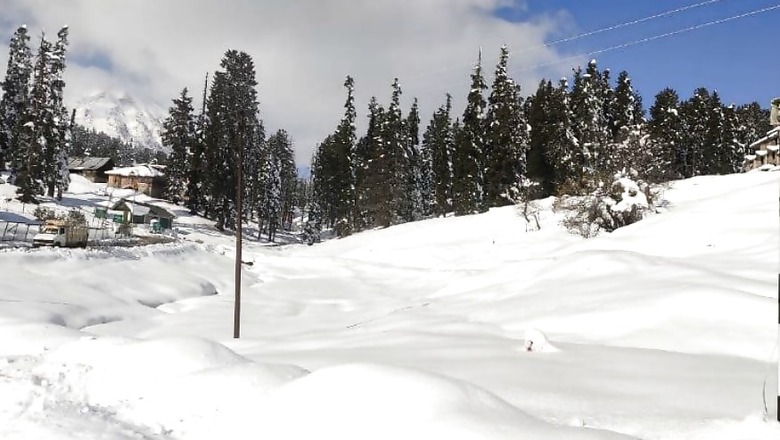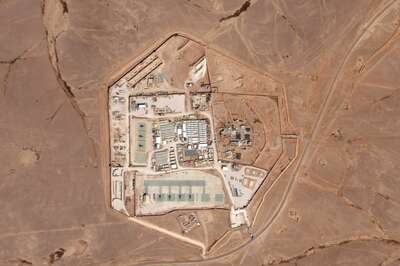
views
A large part of the plains in Kashmir experienced the season’s first snowfall on Monday as the mercury dipped in most parts of northern India, with Delhi coming under the grip of a cold wave where minimum temperature dropped to 6.3 degrees Celsius, the lowest in the month of November since 2003. In south India, authorities prepared contingency measures to deal with the severe cyclone “Nivar” that is expected to hit the coastal areas of Andhra Pradesh, Tamil Nadu and Puducherry between Tuesday and Thursday.
The National Crisis Management Committee (NCMC), headed by Cabinet Secretary Rajiv Gauba, reviewed the status of the cyclone and directed that fishermen should not be allowed to venture out to the sea. A cold wave gripped the national capital and minimum temperatures dropped to 6.3 degrees Celsius, five notches below normal and the lowest in the month of November since 2003. After nearly 10 days, Delhi’s air quality also deteriorated to the “very poor” category, with government agencies predicting that it is likely to worsen in the next two days due to slow winds and low ventilation.
According to the Central Pollution Control Board (CPCB) mobile app, SAMEER, the city’s air quality index (AQI) was recorded at 281 on Monday morning and deteriorated to 302 in the evening. “The AQI is likely to deteriorate towards the high end of ‘Very Poor’ by tomorrow and likely stay at the high end of ‘Very Poor’ on November 25 and may reach ‘Severe’ in few locations for short period,” Ministry of Earth Sciences’ air quality monitor, SAFAR, said. While the Safdarjung Observatory which provides representative data for the city, recorded a minimum of 6.3 degrees Celsius, the mercury dropped to 6.4 degrees Celsius at the Lodhi Road weather station.
The icy cold winds blowing from snow-laden western Himalayas have led to a dip in the mercury, officials said but added that the minimum temperature will rise by two to three degrees Celsius in the next four to five days under the influence of a fresh Western Disturbance. In Kashmir, the Srinagar-Leh road which connects the valley with Ladakh was closed as most of the plain areas in Kashmir experienced the season’s first snowfall and the higher reaches witnessed heavy precipitation.
The famous ski-resort of Gulmarg, in north Kashmir, recorded four inches of fresh snowfall during the night, while Pahalgam tourist resort in south Kashmir, recorded 10 cm of snow, the official said. The MeT office has issued an ‘Orange Colour’ weather warning for the higher reaches of J-K and Sonmarg -Zojila axis on the Srinagar-Leh road, asking the administration and people to be prepared and to maintain vigil.
The Jammu-Srinagar National Highway was also closed for traffic due to fresh snowfall and landslides in Ramban district. Several high reaches of Himachal Pradesh also received fresh snowfall, with the tribal district Lahaul and Spiti’s administrative centre Keylong recorded as the coldest place in the state at minus 3.8 degrees Celsius Kalpa in the state recorded 6.6 cm snowfall while Keylong and Narkanda receiving 5 cm and 3 cm of snowfall respectively in the past 24 hours. Some parts of the state also received light rains. The minimum temperatures hovered below normal limits at many places in Haryana and Punjab.
While Hisar in Haryana was the coldest place recording a minimum of 5.9 degrees Celsius, five notches below normal limits, in Punjab, Bathinda was the coldest place recording a low of 5.6 degrees Celsius. In Rajasthan, Mount Abu was recorded as the coldest place with a night temperature of zero degrees Celsius while in the plains, Churu remained the coldest with a minimum temperature of 5.8 degrees Celsius, followed by Bhilwara at 7 degrees Celsius.
The weather office has predicted light rains in Jaisalmer, Nagaur, Bikaner, Ganganagar, Hanumangarh, Churu and adjoining areas of western Rajasthan due to a western disturbance during the next 48 hours. Most parts of Uttar Pradesh also recorded temperature below normal for this part of the year, with Muzaffarnagar emerging as the coldest place in the state at 5.5 degrees Celsius. Cold wave conditions also occurred at isolated places in east Uttar Pradesh. In the south, while the Tamil Nadu government reviewed the cyclone situation and asked the respective district administrations to be on guard, frontline departments in Andhra Pradesh went into a high alert mode and asked fishermen not venture out into the sea for three days. The Puducherry administration has also drew up a multi-pronged plan to face the cyclone.
Tamil Nadu Chief Minister K Palaniswami asked his cabinet colleagues and officials to remain fully alert and take appropriate precautionary measures to minimise the damage likely to be caused by the weather system. Meanwhile, Andhra Pradesh State Disaster Management Commissioner K Kanna Babu asserting that fishermen should not venture into the sea for three days as it will be turbulent. “We have already alerted the Collectors of these districts and asked them to take required precautionary measures,” he said. Puducherry Chief Minister V Narayanasamy said the government was working on setting up 80 relief centres in Puducherry and separate centres in Karaikal, control rooms in all the departments and rehabilitation of people in low-lying areas.
Read all the Latest News, Breaking News and Coronavirus News here
















Comments
0 comment